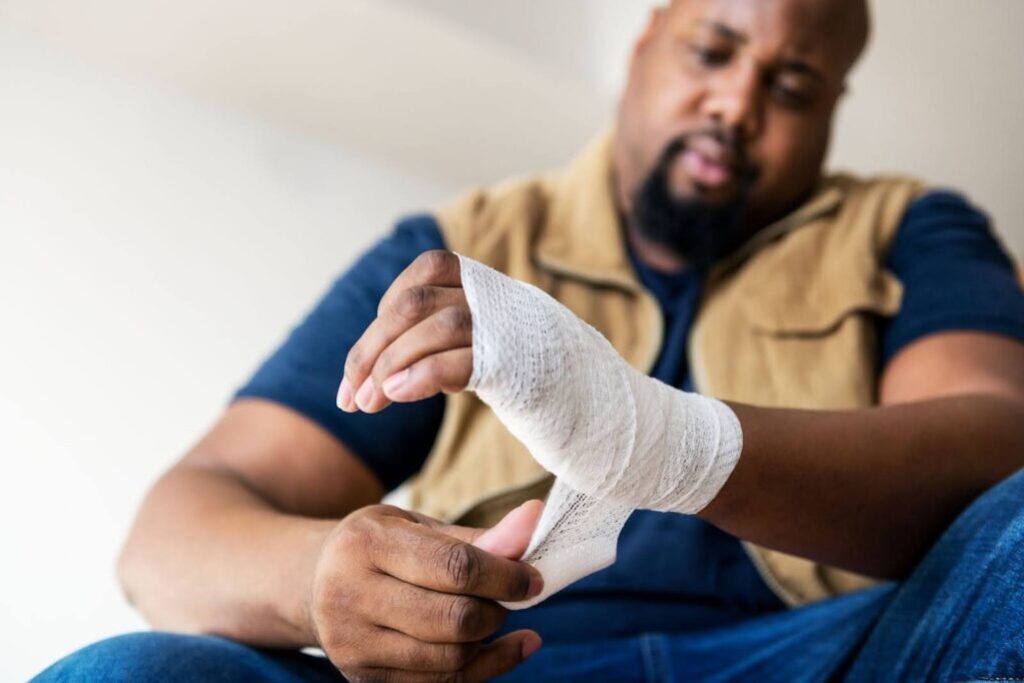Workers’ comp laws differ by state, so workers should know where to find accurate information if they believe they’re eligible after sustaining a work-related injury. California workers’ compensation law covers certain injuries and exempts others.
This guide discusses who is protected by workers’ compensation, which types of job-related injuries and illnesses are covered under California Workers’ Compensation Law, which types of injuries are not covered, and when to contact a lawyer.
What is Workers’ Compensation?
Under California Workers’ Compensation Law, employers must be able to provide benefits when a worker’s sickness or injury is directly caused by or initiated by their work. If an employee falls ill or gets injured while performing their job duties, the employer must provide compensation and support to the employee.
Employers are required to have workers compensation insurance. Workers’ compensation not only includes financial benefits but also covers medical expenses incurred as a result of an on-the-job injury or illness. This ensures that employees do not have to bear the burden of medical bills and can receive necessary treatment without any financial strain.
Additionally, workers’ compensation provides benefits for both temporary and permanent disabilities. Employees who are temporarily unable to work because of their work-related condition can receive compensation to cover their lost wages during recovery.
On the other hand, if the illness or injury results in a permanent disability that affects the employee’s ability to work in the long term, they may be eligible for ongoing financial support to compensate for their reduced earning capacity.
Overall, California Workers’ Compensation Law aims to protect employees by ensuring they receive appropriate benefits and support when they suffer work-related illnesses or injuries.
This system not only provides financial assistance but also helps facilitate the necessary medical care and rehabilitation for injured workers, allowing them to recover and return to work as soon as possible.
What Counts as a Work-Related Injury in California?
In the state of California, workers’ compensation is contingent on the “work-relatedness” of the injury or illness.
California Labor Law considers “an injury or illness to be work-related if an event or exposure in the work environment either caused or contributed to the resulting condition or significantly aggravated a pre-existing injury or illness.” A work injury is when someone gets hurt while doing their job. It can be any kind of physical harm or damage.
In order for a worker to be eligible for workers compensation in California, the injury or illness must meet certain requirements:
- The injury took place while at work or while carrying out job-related duties;
-
- The injury caused either a temporary or permanent disability, required medical treatment, or resulted in lost wages; and
- The injury was reported to the employer within 30 days of the incident, pursuant to Labor Code Section 5400 – California workers compensation law.
Examples of Work-Related Injuries and Illnesses
Workers’ compensation benefits cover two types of workplace injuries:
- One-time event at work. For example, a burn from a chemical splashing on your skin or a back injury from falling off machinery.
- Repeated exposures at work. For example, stress injuries from making the same motions over and over or hearing loss from constant loud noise.
One-Time Occupational Injuries
Single-event injuries can occur in various work environments, such as offices, factories, construction sites, or even outdoor settings. Some common causes include slips, trips, and falls, which can happen because of wet or uneven surfaces, cluttered work areas, or inadequate lighting.
One-time job-related injuries and illnesses:
- cuts
- burns
- fractures
- sprains
- strains
- bruises
- concussions
Long-Term Occupational Injuries and Illnesses
Occupational disease refers to any illness or health condition that is directly caused or significantly influenced by exposure to hazards or risks in the workplace. Various types of occupational illnesses and diseases are associated with different industries and work environments.
Some diseases may manifest immediately after exposure, while others may take years or even decades to develop. Illnesses and symptoms can vary from mild discomfort to chronic pain, organ damage, or even life-threatening conditions:
- Respiratory diseases – lung cancer, mesothelioma, chronic cough, chest pain, respiratory failure, silicosis, or asbestosis can occur in workers who are exposed to harmful dust particles or asbestos fibers.
- Skin conditions – eczema, dermatitis, or chemical burns can develop in individuals who regularly come into contact with certain chemicals, irritants, or corrosive substances. Repeated exposure to chemicals can lead to long-term skin disorders that require ongoing medical treatment and can significantly impact the affected worker’s ability to perform their job. Symptoms range from mild irritation and redness to more severe symptoms such as blistering, swelling, and even permanent scarring.
- Hearing loss – Noise-induced hearing loss (NIHL) is a common worker injury in industries with high noise levels, such as construction or manufacturing. NIHL can occur gradually over time or suddenly due to a single loud noise event. Symptoms of hearing loss may include difficulty understanding speech, ringing in the ears (tinnitus), and a general decrease in the ability to hear sounds. If left untreated, hearing loss can have a profound impact on a worker’s personal and professional life, leading to communication difficulties, social isolation, and decreased job performance.
When a workplace injury occurs, it is essential for the injured employee to report the incident to their employer as soon as possible. This allows for prompt medical attention and ensures that the incident is properly documented. In many cases, employers are required to provide workers’ compensation benefits to cover medical expenses, lost wages, and rehabilitation costs for employees who suffer occupational injuries.
If you have sustained an injury that may be covered by workers’ compensation, reach out to us at Khanuja Law for help recovering your benefits.
Types of Injuries and Illnesses Not Covered by Worker’s Compensation:
While workers’ compensation law is designed to protect employees, some injuries and illnesses are excluded from benefits. It is important to know before filing a claim, which situations are exempt from being compensated.
Some Psychological Conditions
Worker’s Compensation law in California does not generally cover mental health or psychological conditions such as anxiety, depression, and stress. However, an employee may be eligible for compensation benefits if employment events, such as a work-related injury or stressful work environment, are the main cause of a documented, disabling mental health condition.
Pursuant to CA Labor Code, section 14300.5(b)(2)(I): Mental illness will not be considered work-related unless the employee voluntarily provides the employer with an opinion from a physician or other licensed health care professional with appropriate training and experience (psychiatrist, psychologist, psychiatric nurse practitioner, etc.) stating that the employee has a mental illness that is work-related.
Injuries sustained during a lunch break
Lunch breaks in California are regarded as “off-duty” times. Therefore, injuries incurred during meal times are not generally covered by workers’ compensation. Similarly, if the injury occurred when the employee was present in the workplace as a member of the public rather than an employee, the injury may not warrant compensation, pursuant to Labor Code – Section 14300.5(b)(2)(A).
Additionally, a worker may not be compensated if their injury or illness resulted from eating, drinking, or preparing food or drink for personal consumption (whether bought on the employer’s premises or brought in). For example, the case would not be considered work-related if the employee is injured by choking on a sandwich while in the employer’s establishment (Labor Code – Section 14300.5).
There are some situations in which an injury that is sustained during a meal break may be covered.
- The injury happened during a rest period, not a lunch break – If the injury took place while having a snack during a rest period rather than an official lunch or meal break, it could be covered by workers’ compensation.
- Injury happened at or close to the workplace – A worker’s injury is more likely to be covered by compensation if the injury is sustained during a meal break taken at or near the workplace.
- The harm happened over a “working” lunch – If a worker is not allowed to sign out for lunch breaks and gets hurt while carrying out job-related tasks during lunch, there’s a possibility they may still be eligible for workers’ compensation benefits.
- Injury or illness is a result of ingesting food contaminated by workplace contaminants (such as lead) or from food supplied by the employer. In these cases, the injury or sickness can be compensated directly due to workplace events.
Injuries from employee misconduct or horseplay
Injuries caused by horseplay or deliberate acts of employee misbehavior, such as wrestling in the breakroom, are generally not included under California’s workers’ compensation. Likewise, if a worker gets hurt because of intoxication at work, they probably won’t be eligible to receive benefits.
Injuries that surface at work but are caused by non-work-related factors
Sometimes, an injury or illness may show signs or symptoms that initially surface at work but are a result solely of a non-work-related event or exposure.
Injury or illness from voluntary participation
Employees who suffer injuries or illnesses solely due to their voluntary involvement in work-associated activities or programs (like wellness initiatives or medical, fitness, or recreational activities such as donating blood, undergoing physical check-ups, getting flu vaccinations, participating in exercise classes, playing racquetball, or baseball) that take place at the workplace are typically not protected by workers’ compensation.
Injury or illness from personal tasks at work
An employee is unlikely to receive compensation if the injury or illness is solely the result of doing personal tasks (unrelated to employment) at the workplace outside of the employee’s assigned working hours. As previously mentioned, if the injury happened when the worker was on-site as a member of the public rather than an employee, they are unlikely to be protected by California law.
For example, if an employee with a set of keys to the office gets injured while using the office to tutor college students during non-work hours, their injury would not be covered.
Another situation in which an employee would not receive compensation is if the injury or illness is solely the result of personal grooming, self-medication for a non-work-related condition, or is intentionally self-inflicted.
When Should I Contact a Workers’ Compensation Lawyer?
While it is not always feasible, contacting a workers’ compensation lawyer as soon as the injury occurs or is known is highly recommended. This is because the process of receiving the benefits you’re entitled to is often a complex and time-consuming legal process. By reaching out to an experienced attorney, you can ensure that your rights are protected and that you receive the compensation you deserve.
What can a workers’ compensation lawyer do for me?
A workers’ compensation lawyer can help in various situations:
- when you are unsure about your rights and entitlements
- when your workers’ compensation claim is denied or disputed
- when you face retaliation from your employer
- when you have a pre-existing condition aggravated by work
- when you have difficulties obtaining medical treatment
A workers’ comp attorney can provide legal advice, gather evidence, represent you in negotiations or hearings, protect your rights, and advocate for your healthcare needs.
Khanuja Law’s legal expertise and guidance can help you navigate the complex legal process, protect your rights, and maximize your chances of receiving fair compensation for your workplace injuries.



